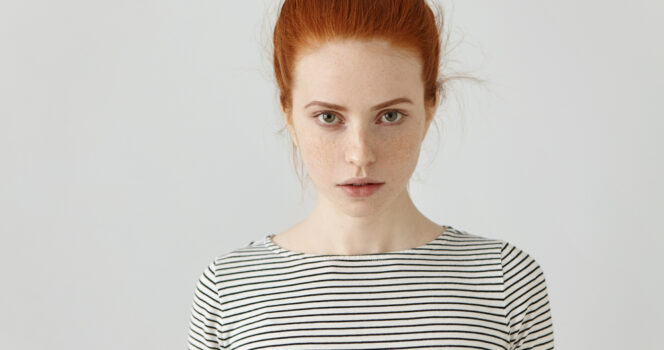
Older generations are calling out zoomers for the Gen Z stare – a disturbing gaze that leaves people confused, uncomfortable, and wondering what happened to basic human interaction.
A new viral debate is sweeping TikTok and X, and it’s all focused on one thing: the Gen Z stare.
Older generations – millennials, Gen X, and boomers – say they’ve had enough of the blank, emotionless gaze they claim to receive from zoomers – the cohort of people born between 1997 to 2012 – especially from young people in customer service roles.
Now, what started as a casual complaint has evolved into a full-blown internet phenomenon.
Unique to Gen Z
The term Gen Z stare, describing the neutral-to-vacant facial expression, has exploded across social media, sparking heated generational debates, trending hashtags, and viral stitches from every corner of the internet.
To previous generations, the effect can be deeply uncomfortable. But to Gen Z it’s just how they show up.
‘They just stare at you’
According to Know your Meme, the Gen Z stare was first popularized on TikTok in July 2024 after a millennial content creator posted a video describing the strange phenomenon.
“I swear,” she said, sitting in her car with wide eyes, “every time I’m in public and it’s a Gen Z worker, they just stare at you…like even if you say something to them.”
That two-minute clip, that went viral, opened a cultural floodgate – and Gen Z isn’t taking the criticism lightly. Many are pushing back, arguing that the stare isn’t apathy or attitude – it’s a symptom of burnout, anxiety, or just tired social norms.
“I’m sorry, I can relate. We all deserve better than what older generations have passed down for us to deal with,” shares one netizen in the comment section.
“We don’t feel human anymore we are tired so, so, so tired. We must detach to keep on frequently, thank you,” offers a second online user.
A third, sets it straight: “We just don’t like fake interactions, even at our work. Like order your food and go, we are not best friends.”
Others poked back at the creator, slamming her “millennial pause.”
“Every time you did the millennial pause I thought you were impersonating the stare,” one user joked, while another said, “the ammount of millennial pauses you did, I’m crying.”
Always in the spotlight
But this isn’t just a generational quirk. What began as a viral anecdote is now being dissected by psychologists, debated by employers, and unpacked by social critics trying to understand what’s really behind this expressionless, unflinching, and – to some – almost haunting gaze.
Tam Kaur, a 24-year-old author and cultural commentator, argues that writing off the “Gen Z Stare” as simple rudeness misses the point entirely. To her, that blank gaze is less about apathy and a “symptom of something deeper.”
“We’re the first generation to grow up with our faces constantly on display in selfies, stories, video calls, with everything being scrutinized online,” Kaur said, per Metro. “That creates a heightened sense of self-consciousness and a fear of being judged, even in the smallest interactions.”
According to Kaur, the pressure to appear polished and unproblematic at all times makes even a basic greeting feel like a performance. While previous generations could walk into a room without thinking twice, Gen Z is always in the spotlight – whether they want to be or not.
“Previous generations didn’t have to think about how they looked from every angle or whether they sounded awkward saying hello, but Gen-Zs do.”
An ‘overwhelmed’ generation
Meanwhile, workplace wellbeing consultant Bex Spiller believes the Gen Z stare may be more than just a passive habit – it could be a warning sign. According to her, some Gen Z workers aren’t simply unwilling to engage – they might be physically and mentally unable.
“This generation has entered the workforce during a time of incredible pressure with rising living costs, unstable job markets and constant digital noise,” Spiller told Metro. “It’s unsurprising that this would cause their nervous system to react in a way that looks like they’re going blank or disconnecting. Like fight or flight, our nervous system also has ‘freeze’ and that could be what we’re seeing in a generation that feels overwhelmed right now.”
When faced with the infamous Gen Z stare, Spiller urges people to look past the blank expression and lead with empathy.
“We’ve spent decades rewarding people for being constantly ‘on,’ but that’s just not sustainable and maybe the ‘stare’ is telling us that,” she says.
‘Need to process’
And, Tam agreed.
“A moment of stillness might feel awkward to you, but for some people it’s exactly the time they need to process what’s just been said. Especially for younger people who may be navigating anxiety or a lack of social confidence, that pause isn’t necessarily them being rude, it’s them trying to find their words,” Tam added of the generation that came of age during a global pandemic, isolated from social development during key formative years.
Have you ever felt the ice-cold Gen Z stare? Please share your thoughts with us and then share this story so we can hear from others!
READ MORE
- Man says millennials age better, causes heated debate between generations
- Millennial asks mom how she managed to work and raise kids, sparks debate




